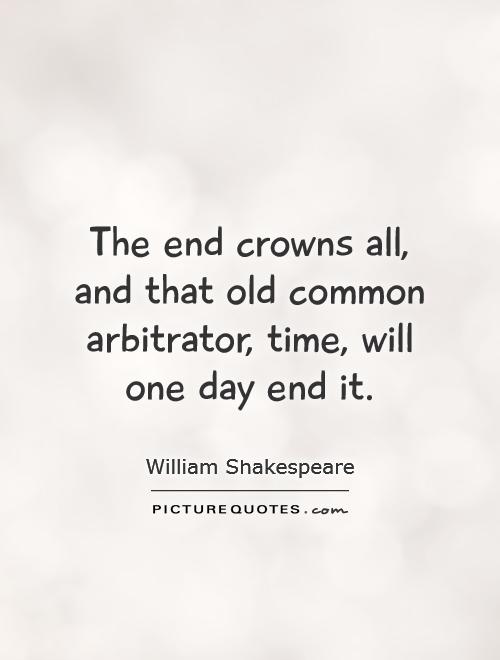The end crowns all, and that old common arbitrator, time, will one day end it

The end crowns all, and that old common arbitrator, time, will one day end it
In the world of William Shakespeare, the concept of time and its ultimate power over all things is a recurring theme. The quote "The end crowns all, and that old common arbitrator, time, will one day end it" encapsulates this idea perfectly. Shakespeare often explored the passage of time and its effects on individuals, relationships, and society as a whole in his works.Throughout his plays and sonnets, Shakespeare delves into the inevitability of time and its ability to bring about both destruction and renewal. Time is portrayed as a relentless force that cannot be stopped or controlled, and that ultimately has the power to determine the fate of all things. In tragedies such as "Macbeth" and "King Lear," time is shown to be a cruel and unforgiving force that brings about the downfall of the protagonists. In comedies like "A Midsummer Night's Dream" and "Twelfth Night," time is depicted as a transformative power that can heal wounds and bring about resolution.
The idea that "the end crowns all" suggests that ultimately, time will reveal the true outcome of all things. No matter how chaotic or uncertain the present may seem, time will eventually bring about a resolution or conclusion. This idea is echoed in many of Shakespeare's works, where characters are forced to confront the consequences of their actions as time marches on.
The phrase "that old common arbitrator, time" highlights the universal nature of time as a force that affects all people equally. Regardless of social status, wealth, or power, time is a constant presence in everyone's lives. Shakespeare often used time as a way to level the playing field, showing that even the most powerful individuals are subject to its influence.












 Friendship Quotes
Friendship Quotes Love Quotes
Love Quotes Life Quotes
Life Quotes Funny Quotes
Funny Quotes Motivational Quotes
Motivational Quotes Inspirational Quotes
Inspirational Quotes